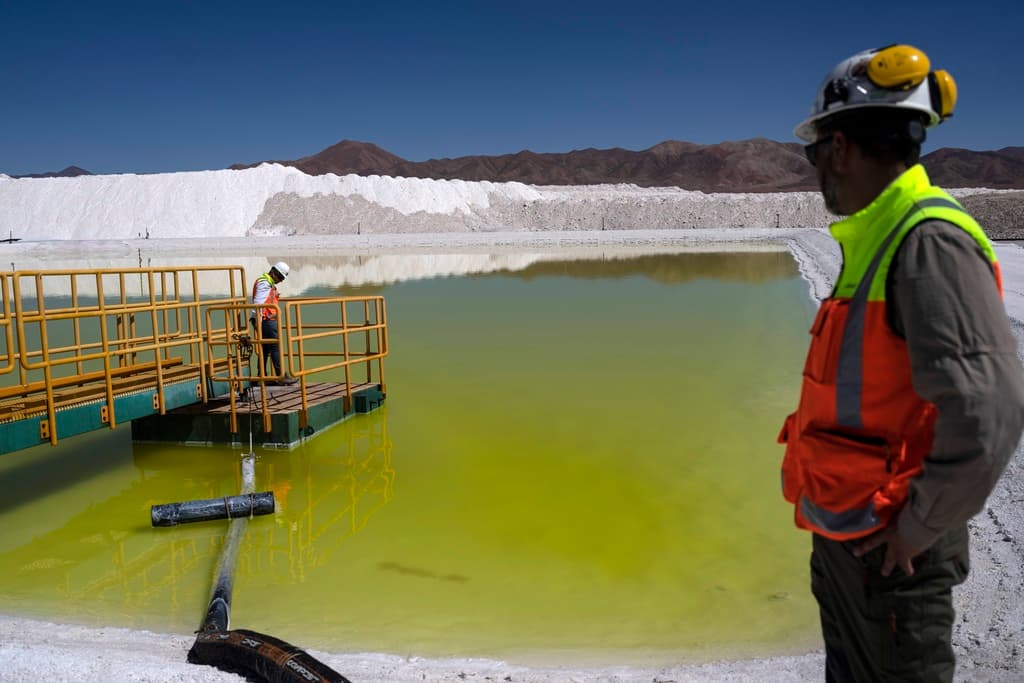China Outmaneuvering Yanks, as Chile Moves to Nationalize Lithium Production
Beijing has a ‘serious first mover advantage’ over the lithium production in the hemisphere, analysts warn.

As President Biden leans further into his administration’s promotion of electric vehicles, the leftist government of Chile is nationalizing production of lithium and Communist China is edging America out of the hemisphere’s market for a mineral that is essential to those vehicles’ batteries.
The Chilean president, Gabriel Boric, announced Thursday a new lithium policy that demands “virtuous collaboration” between the state and the private sector over the extraction of lithium. The government, however, will maintain full control over the enterprise, he said.
The Chilean government will participate in every step of the production of lithium, Mr. Boric said. Private companies that want in will have to “associate” with the state, Mr. Boric added, announcing his intention to form a national lithium company that he hopes will eventually be the world’s leading producer.
Chile’s minister of mining, Marcela Hernando, said that the government cannot process lithium alone because the private sector has the essential technology and knowledge. Even though a public-private partnership is needed, Ms. Hernando said, “the state is the owner of the lithium,” something that is “uncompromisable” for the government.
“It’s a difficult balance to strike,” the director of the Latin American Program and the Argentina project at the Wilson Center, Benjamin Gedan, tells the Sun. “It remains to be seen whether Chile is chasing away private investment with this approach, or whether it has found the right middle ground,” Mr. Gedan says.
Chile has the third largest global reserve of lithium, with 9.6 million tons. Bolivia has the lead with 21 million tons, followed by Argentina with 19.3 million tons. Together, the three South American countries, known as the “Lithium Triangle,” own 58 percent of the global lithium reserves between them, according to the 2021 USGS Mineral Commodity Summary.
Global demand for the mineral is expected to increase more than five-fold by the end of the decade, a report by public-private alliance Li-Bridge says, as lithium batteries will power most vehicles produced in the next 50 years.
This year Communist China closed several deals to exploit lithium in South American countries. Beijing has a “serious first mover advantage” over the lithium production in the hemisphere, Mr. Gedan says.
America’s need for lithium and other minerals and metals “that are found in abundance in Latin America” is increasing rapidly, Mr. Gedan says. “Hopefully the United States recognizes that South America is a central battleground for competition with China for critical minerals.”
Only one percent of the world’s lithium is produced in America, according to the U.S. Geological Survey. Most of that production comes from its major lithium mine in Silver Peak, Nevada, a remote and deserted area located three hours north of Las Vegas.
American demand for lithium will grow nearly six-fold by 2030, the Li-Bridge report says. Under the current conditions, however, America will only be able to cover 30 percent of that domestically. The remaining 70 percent will have to come from foreign sources.
In 2023, Communist China announced ambitious plans to invest in the Lithium Triangle. In Bolivia, the Chinese companies CATL, BRUNP, and CMOC will invest over $1 billion. In Argentina, Cheryl Automobile will dole out $400 million for a factory that builds electric vehicles. In Chile, Tsingshan Holding Group, Ruipu Energy, Battero Tech, and FoxESS will invest in an industrial lithium park.
The head of America’s Southern Command, General Laura Richardson, has warned against allowing Beijing to expand its economic, diplomatic, technological, and military influence in Latin America.
“This region is full of resources and I am concerned about the malign activity of our adversaries taking advantage of that. It seems that they are investing when in reality they are extracting,” Ms. Richardson said earlier this year. She added that Beijing’s “aggressive” investment in the lithium triangle is advancing fast.
President Biden announced last year the administration’s commitment to investing in “key critical minerals,” including lithium, that are essential for the building of “many modern technologies.”
“The U.S. is increasingly dependent on foreign sources for many of the processed versions of these minerals,” the administration said in a statement. “Globally, China controls most of the market for processing and refining for cobalt, lithium, rare earths, and other critical minerals.”
Washington should find ways to support American companies in taking advantage of the mineral opportunities in the Western Hemisphere, Mr. Gedan says. “Without exaggerating,” he says, “the future of the global energy transition” depends on the decisions made in Bolivia, Chile, and Argentina.
“If there’s going to be enough lithium and at affordable prices, it will be because the right decisions were made in South America,” Mr. Gedan adds.

